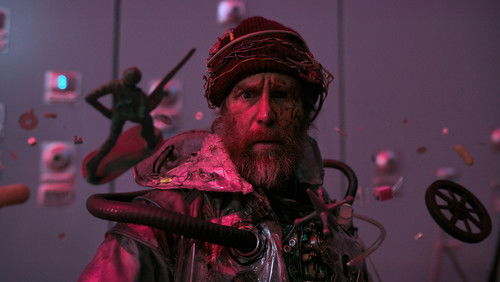Paycheck – Die Abrechnung (2003)
46KPaycheck – Die Abrechnung: Directed by John Woo. With Ben Affleck, Aaron Eckhart, Uma Thurman, Paul Giamatti. What seemed like a breezy idea for an engineer to net him millions of dollars, leaves him on the run for his life and piecing together why he’s being chased.
“Rating: ** out of **** u003cbr/u003eu003cbr/u003eI wonder what it says about the state of cinematic science fiction that most of author Philip K. Dicku0026#39;s adaptations generally mix high-octane action with its interesting sci-fi concepts. Paycheck is no exception, hardly a surprise when you note itu0026#39;s from once beloved Hong Kong filmmaker John Woo, whou0026#39;s quickly reaching Michael Bay/Roland Emmerich levels of notoriety in the U.S. with each regressive film.u003cbr/u003eu003cbr/u003eTo be fair, Paycheck isnu0026#39;t unenjoyable, and it even gets off to a pretty good start. Set sometime in the near future, thereu0026#39;s not much of a noticeable difference with our present time except for a few elaborate-looking gadgets and computers. Ben Affleck stars as Michael Jennings, a reverse engineer whou0026#39;s hired by major corporations to build products superior to all rival companies. Afterwards, his memory is erased by a partner of his (Paul Giamatti) and heu0026#39;s given a large paycheck for his time and troubles (usually the whole process takes about three months).u003cbr/u003eu003cbr/u003eHis latest offer comes from an old friend of his (Aaron Eckhart), who promises an eight-figure deal at the end of the transaction. The catch is that the whole procedure will take three years. Despite some reluctance, he agrees to the deal and when the three years pass by, Jennings, thinking heu0026#39;s a rich man, is shocked to discover he gave up over ninety million dollars in favor of an envelope containing twenty everyday household items. Now he finds himself on the run from both the FBI and the company that hired him, and must set out to discover what he built during those three years heu0026#39;s missing.u003cbr/u003eu003cbr/u003eUma Thurman also stars in the movie as Jenningsu0026#39; girlfriend during that three-year span, but she factors so lazily into the picture, sheu0026#39;s obviously only in the film so that a) Jennings can have a love interest and b) he can also have someone to talk to about every little discovery he makes. Then again, function u0026quot;bu0026quot; could have worked just as well with Giamatti, but everyone knows a u0026quot;sexyu0026quot; chick is a better sell (I have to put quote marks around sexy because Thurman looks positively haggard for almost every minute of screen time sheu0026#39;s present; I canu0026#39;t help but feel the much hotter Kathryn Morris would have done better in the role).u003cbr/u003eu003cbr/u003eThere are two concepts in this movie that specifically intrigue me (some moderate spoilers here), the first one is choosing deliberately to erase your own memory, but the notion is forgotten after the first half-hour. I was quite curious to know exactly what the process is like to the subject. Take, for instance, the fact that he lost his memory over the three-year span. Does the last thing he remembers feel like a three-year old memory or an event that happened just a second ago? Instead, all we get is a half-hearted (actually, not even that much) attempt at a sorrowful romance because he canu0026#39;t remember his girlfriend and sheu0026#39;s not very happy about that.u003cbr/u003eu003cbr/u003eThe other major sci-fi concept, the ability to see into the future, isnu0026#39;t explored with much more interest and it leads to a number of baffling questions. You see (quite a few spoilers here), itu0026#39;s revealed Jennings sent himself those twenty items because they can come in handy at a specific moment thatu0026#39;ll help him survive or escape from a dangerous situation.u003cbr/u003eu003cbr/u003eBut the thing is, Jennings couldnu0026#39;t have known each item would come in handy unless he used the device he built at least twenty times, because thereu0026#39;s no way heu0026#39;d know a motorcycle would come in handy if he never had, say, the bus ticket to escape from the FBI, meaning he used the device to see what he needed to escape the FBI, but still foresaw that heu0026#39;d be killed in even more future events. That would mean this guy was originally destined to die or get caught in well over ten different scenarios (i.e. he had the bus ticket to escape, but if he didnu0026#39;t have the motorbike keys, he wouldnu0026#39;t have gotten further, and so on and so forth), but this is never really addressed.u003cbr/u003eu003cbr/u003eBy John Woo standards, thereu0026#39;s surprisingly only a modest amount of action in the film, but at least the material is competently handled, even if itu0026#39;s not entirely believable. What might work in movies that establish their characters as supercops with impeccable aims doesnu0026#39;t come off quite as well in action scenes that feature scientists beating up a large number of armed goons. But if you suspend disbelief, the action scenes are pretty fun (especially the motorcycle chase and the laboratory battle), and coupled with the relatively fast pace, keep the movie perfectly watchable despite the poor script and mediocre acting (I never got into specifics, but this is Ben Affleck and Uma Thurman weu0026#39;re talking about).u003cbr/u003eu003cbr/u003eWhen all is said and done, Paycheck is a wasted opportunity and is never as memorable a mixture of science fiction, mystery, and action as Minority Report, but itu0026#39;s likely to do the trick for undemanding fans of any of these genres. If you expect more, well, youu0026#39;d do best to remember this is John Woo weu0026#39;re talking about, not Steven Spielberg.”









